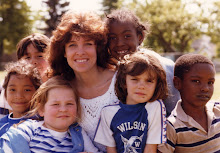This s-word keeps resurfacing in my life with kids, and I'm curious about why. I have one hypothesis and would love to hear from you what you think! Here are the three s-word stories.
Serious story #1
"Our teacher is serious," Vanna whispers to the teaching assistant who's waiting to take them to lunch. Vanna is learning English so I'm not sure exactly what she thinks I mean when I gather the first graders on the rug to review their responsibilities during our reading/writing workshop period. Our student teacher had ended her time with us the Friday before, and I was seriously recalibrating our daily 100-minute work period.
(There's a deep structure and predictability to workshop teaching that might escape recognition for those more accustomed to teacher-directed curriculum. The student teacher was able to depend on the deep structure I had created with the kids in the fall, which is different that creating it oneself, and it had gone a little off track.)
Serious story #2
"Kathy, is that the Serious Tower? Can we take the elevator?" Imagine my laugh! At 108 stories and taller than the World Trade Center, the Sears Tower is serious enough! Eight-year-old T and I are in Chicago for the day and the Sears Tower is one of our destinations. Of course an 8 year old wouldn't connect Sears with a tall building, even if she did recognize it as a store in her community. (Official name change to Willis Tower as of 7.16.09.)
Serious story #3
"Hey, are you serious?" three-year-old Morgan yells to the landscape gardeners working next door. This got a chuckle out of all of us, and several of the guys look up to our deck. "Yeah, we're serious." And you know three year olds: "What are you doing?" "How come?" And again, "But are you serious?" It wasn't long before they stayed focused on their work and seriously ignored him!
Why "serious"?
I've spent time with many kids over many years, and their use of serious has singularly caught my attention. For my part, I'm loving how the sound of the word slides out of my mouth, and kids could love that, too. And I'm guessing that most of us slow down and slightly exaggerate our enunciation of it when we use it with kids, and it seriously sticks with them! What do you think?
7.16.2009
Subscribe to:
Post Comments (Atom)




I think that one of the jobs of childhood is to figure out what matters. Kids are truly trying to determine what is serious and what is not. Adults often tease kids, so the divide between serious and not serious takes even more importance as kids try to prepare themselves to respond to adults' sometimes-serious and sometimes-teasing.
ReplyDeleteI'm late to this one - but what a gorgeous post. You're right, some words just taste so good.
ReplyDelete"There's a deep structure and predictability to workshop teaching that might escape recognition for those more accustomed to teacher-directed curriculum."
This is a really interesting idea that I'd like to see more on. Are you talking about 'deep structure' (in the sense of 4 'R's -Roles, Routines, Responsibilities, Rules) and constructing an atmosphere for learning on top of that?
BF--My use of the term "deep structure" is probably from my background in linguistics. Often workshop teachers will talk about the importance of predictable structures, but I think it's more than that, and slightly different than roles, routines, responsibilities.
ReplyDeleteI'm curious why the phrase caught your attention. What are you thinking?
I'll take another day to think through the differences for you and share here again!
The issue of deep structures in teaching is a complex one to talk about--one of those parts of teaching that is hard to quantify. Perhaps it begins with establishing an understanding of "what learning is" within the community, or what literacy is.
ReplyDeleteThat definition + an understanding of learning theory provides a foundation for the kinds of engagements I create for kids. Then the rituals and routines that allow us to work in a relatively small place together (from AZ colleague, Ralph Peterson). And yes, then the responsibilities and rule-setting (why are we here? how do we need to be together to make that happen?). Then negotiating as kids bring their own ideas to the mix.
The deeper structure allows for flexibility on the surface. Sometimes people comment to me, "It's great to be in a classroom with no structure." Or a student teacher's insight that the work was never finished in my classroom, while in others, kids chirped all day: "I'm done! I'm done!" Other people can just feel it but not know how one would get there.
I have never accomplished quite this success with adult learners in a class setting (e.g. in one semester I would see students fewer hours than I saw elementary-aged kids in two weeks), and in schools I have little control over many of the structures. But over time I can establish a sense of what it means to learn/inquire as a teacher. That helps teachers feel both smarter, and humbled by all there is to know. In this instance the deep structure is an inquiry process (part of my mentors' work, Jerome Harste and Carolyn Burke, from Indiana University).
As a presenter, I think one of my strengths is the love of kids (and teachers) and their learning that comes through in what I share. I don't have as deep a felt understanding of adult learning principles so I have to more consciously work at those. My colleague Cathy Toll is theorizing important work in that area.
Training? In my mind that's another issue altogether, particularly as training usually involves a briefer yet amount of time and a distinct body of information to be shared. It sure helps to have an engaging personality and deep knowledge of the topic so you can think on your feet.
Does any of this resonate with what's on your mind?